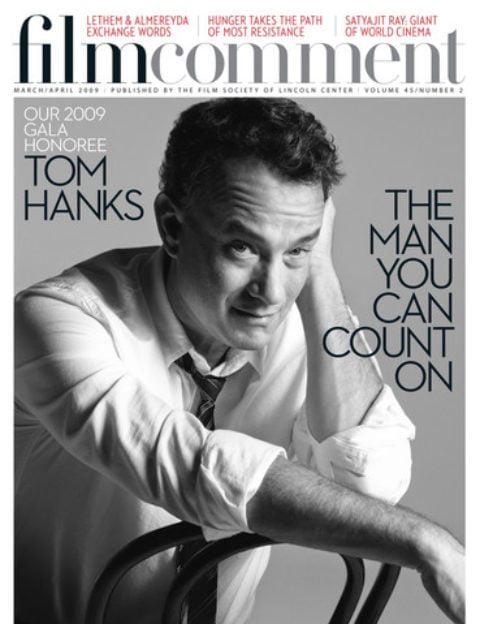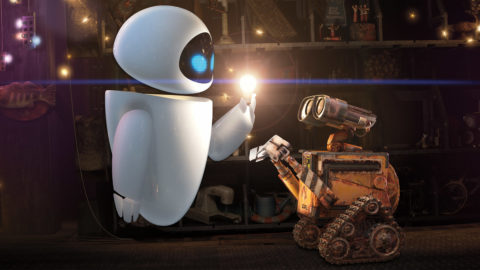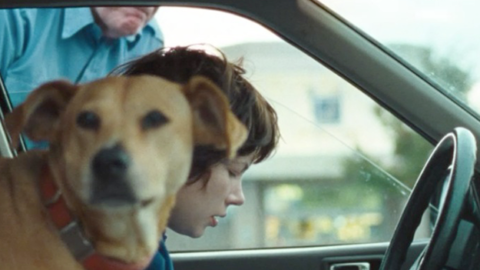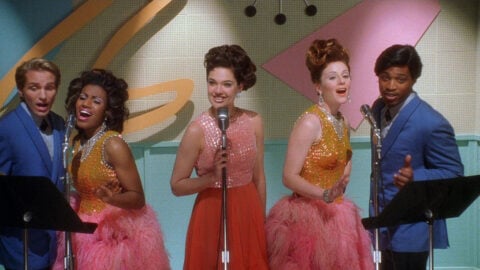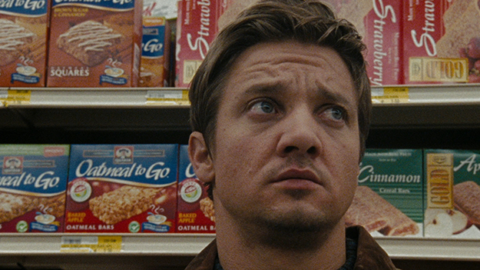
WALL·E (#1)
Pixar once again brilliantly unifies technical and visual gusto with first-rate narrative craft.—David Beal, Orinda, CA
WALL·E has compelling characters, an exciting story, a magnificent score (by Thomas Newman; please give him an Oscar already), beautiful imagery and it’s all done with a snarky sense of humor that is Pixar’s trademark. There’s an environmental message here as well, but other than annoying some talk radio gasbags, no reasonable people were bothered. Much has been made of the dialogue-free first 30 minutes or so; don’t worry about it. I’ve seen this film with audiences of children and they are not bored in the least. Overly serious people will try to dismiss WALL·E as a “kiddie” film. Well, if WALL·E is a “kiddie” film, then so is Singin’ in the Rain.—Michael McGonigle, Philadelphia, PA
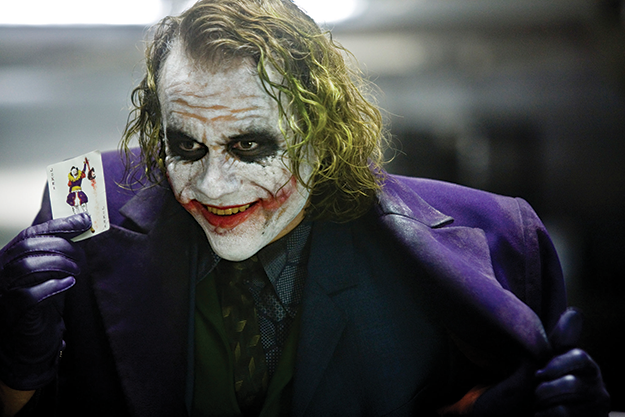
The Dark Knight (#2)
I like to be more radical with my #1, but this film was so transcendent of any film I saw last year!—Ted Haycraft, Evansville, IN
Superhero movies suck. I can’t stand them. Filled with comic relief, CGI, a plot that maybe a 10-year-old would write, they’re awful. But Christopher Nolan made a realistic superhero film that is both dramatic and dark and a whole lot of fun. Yes, Ledger is amazing, but it’s Aaron Eckhart that stole the movie for me. His transformation breaks your heart. This is how you make a superhero film.—James Klein, LaGrange Park, IL
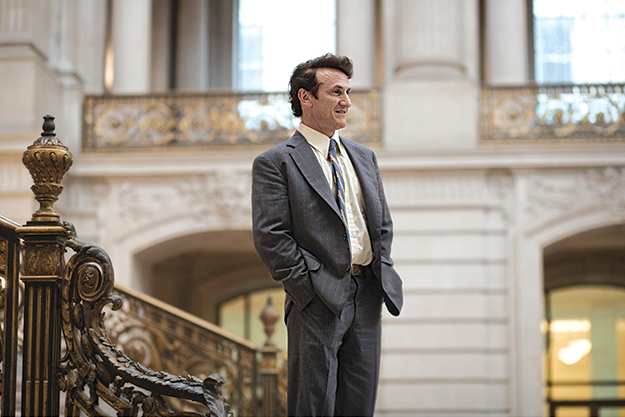
Milk (#3)
So conventional is the treatment of the life of Harvey Milk, that it feels subversive. The one thing that redeems it from being an entirely conventional biopic, radical or not, is the gorgeous, generous performance of Sean Penn as Harvey Milk. There are other wonderful performances in the movie, most notably James Franco and Emile Hirsch, and as always, Josh Brolin (who should have been nominated for his excellent work as Bush in W.). There is more chemistry and tenderness between Penn and James Franco than in hundreds of movies about men and women, which is a radical notion for an American film.—Judy Mam, New York, NY
This film really spoke to me because of the issues that still surround our society, and the performances—especially by Sean Penn, Emilie Hirsch, and James Franco—were nothing short of near-perfection.—David Hollingsworth, Fayetteville, NC
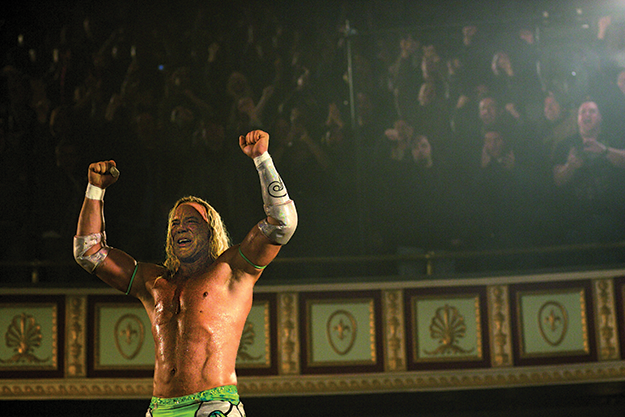
The Wrestler (#4)
I grew up watching wrestling with my dad and my brother, as well as my group of friends. My dad even took us to everything from large televised professional wrestling events to the amateur league events at the local gymnasium that featured over the hill legends and scrubs from the third row. I never understood what those “legends” in our eyes who we idolized and played with their action figures, were doing at these rinky-dink events until I got older. The Wrestler is about just such a scenario. You don’t have to be into wrestling or know anything about it to enjoy this film. Anyone who has ever dedicated their lives to something whether it be a sport, a job, or an art can relate to The Wrestler.—Ryan Slater, North Hollywood, CA
I loved that it was Mickey Rourke sighing and breathing heavily for two hours!—Roxana Moussavian, New York, NY
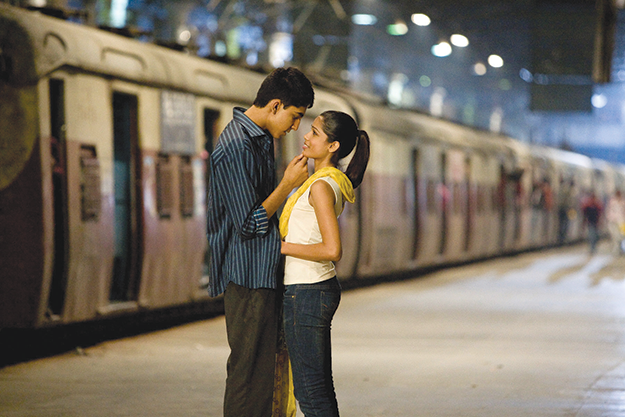
Slumdog Millionaire (#5)
There may be criticisms that Slumdog Millionaire glorifies poverty, with suggestions that happy endings occur in the back-alley slums of Mumbai. I do not give this argument much credence. Scenes still show squalid conditions. Adult criminal elements exploit children. Ethnic/religious tensions flare up. Hardship abounds. Danny Boyle does an exemplary job of revealing the plight of those born to poverty and beautifully juxtaposes that with the brightness of the main character, Jamal. Brightness born of street smarts but also the incessant and positive hope of finding his childhood girl and subsequent love. Accompanying Jamal’s quest to find his sweetheart is a frenetic soundtrack that manages to capture the vibrancy of Mumbai and the ever-changing sentiments of our main character (tension, glee, longing, fear, etc). A story of some improbability but truthful in capturing the sights and sounds of Mumbai and India.—Rafael Gray, Alexandria, VA
It’s funny how this year’s hottest property, Slumdog Millionaire, on a one way train to Oscar glory, holds striking similarities to one of the biggest bombs in recent memory… the critical punching bag Speed Racer. My Racer/Slumdog checklist: flamboyant visual style, high on life, transports audience to a bizarre new world (American audiences anyway), crowd-pleasing formula finale, paper-thin characters built on archetypes, caricature villains, emphasis on childlike innocence, old-fashioned theme of destiny, fractured narrative utilizing flashbacks, and an incredible soundtrack that compels the story.—Bryan Woods, Bettendorf, IA
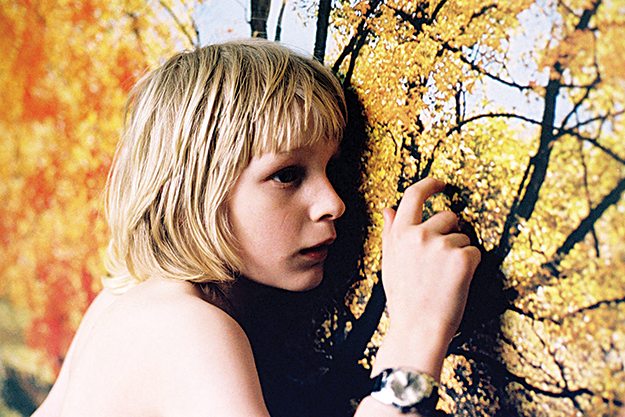
Let the Right One In (#6)
Sweet love story, touching children’s movie, scary vampire film. Throw in some wintry landscapes and a deftly sketched blue-collar milieu and you have one of the most original film concoctions in years.—Michael Smith, Chicago, IL
This is a horror film that puts its characters first and is unlike any I’ve ever seen. It deftly handles switching between horror, dark comedy, and coming-of-age film. The horror scenes are scary and stylish and don’t shy away from gore. The cinematography and score are beautiful, and I can’t imagine finding better child actors. You will hold your breath during the climax.—Cory Everett, New York, NY

Happy-Go-Lucky (#7)
Both Poppy and the film itself show us what it means to be a good teacher: to be kind and hopeful without being naïve, and to show us how to live a good life in a way that is truthful instead of overwhelmingly didactic. Happy-Go-Lucky and its lead actress give us a new kind of hero with a new kind of bravery in a difficult world.—Nicholas Gray, Long Island City, NY
I hated Poppy. I could not stand such a person around me. She is not optimistic, she is hysterical. Her optimism and her laughing does not come from within; it is compulsive. She is not working-class, she is artificial. It is interesting that so many people like her. Perhaps because it represents a picture of the working-class that is not dangerous to a mostly bourgeois audience (and to liberal bourgeois critics).—Martin Abraham, Kiel, Germany
Regardless of whether you like the movie or not, you’ve got to be something of a gargoyle if you don’t derive at least a little pleasure from Mike Leigh’s latest and most cheerful film. This low-conflict character study should be required viewing for all future film school students itching to lens shorts on hit men, drug dealers, drug addicts, girls with anorexia, and gangsters (all from the rather unlikely location of a dorm room). Poppy’s perpetually sunny attitude is less an escapist impulse and more a brave strategy for dealing with life’s burdens. After all, she confronts the world’s ugliness head-on by counseling a violent student, approaching a mentally disturbed vagrant, and in managing her driving instructor’s enraged meltdown. It’s easy for a character this extreme to become a parody of herself, but Leigh’s firm hand keeps things squarely rooted in reality, leaving Sally Hawkins to portray a Poppy that’s effervescent as can be.—Brett Scieszka, Brooklyn, NY

Wendy and Lucy (#8)
This deceptively simple story spoke to me about home—what is home and how close the line is to not having one. In this time of a crumbling economy and natural or manmade disasters, if you don’t have cash or family/friends, you too could be there. Wendy’s home is her car and her dog. She loses both, and there is a beautiful shot of her making her bed carefully in the woods. Yet somehow, in a very American way, it’s hopeful.—Amy Mascena, Brooklyn, NY
So glad you picked this number one! An homage to Umberto D.—a modern and fresh update of that classic and just as poignant if not more so.—Paul Roppolo, Toronto, Canada
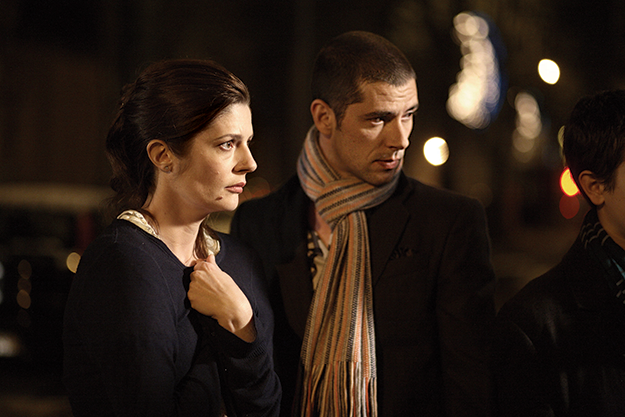
A Christmas Tale (#9)
This is a scrambling madhouse of an ensemble, complete with forked plot points intertwining in a grand tradition of grim idiosyncrasy and fey jubilance. Set-up in their tallways French home, the relatives here skulk about in fits of confrontation, fueling a constant state of great, nostalgic observation. The momentum is held for an achingly long time, barely sputtering out at close and never veering into a familiar or simple set of emotional farewells. It seems reflexive as to its purpose: a comfort film of the absurd.—Ben Trout, Pottstown, PA
Think the opposite of everything the movie Dan in Real Life stands for. A family gathers during Christmastime, the matriarch awaits her families’ bone marrow tests to see if they are a match so she can live, and the bad-boy brother who has been excommunicated returns. As cliché as that sounds, the only thing cliché is the title. The only thing wrapped with a bow are the presents.—Mike Liddell, Hubbardston, MA
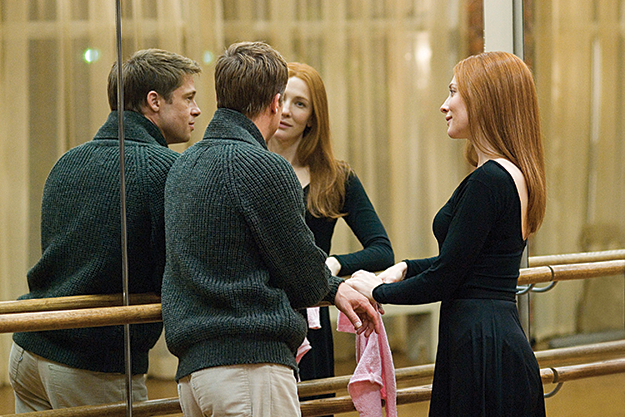
The Curious Case of Benjamin Button (#10)
I’ve heard and read complaints that it is empty or corny or dull, but I think Benjamin Button is the movie of the year because David Fincher, one of our best craftsmen, is working at the top of his game. Zodiac was last year’s best film, and this very different movie shares the same mesmerizing sense of composition and rhythm.—Randall Byrn, New York, NY
A profoundly moving study of aging and death, Benjamin Button takes every cinematographic trick in the book (and invents a few along the way) to tell the story of a man who ages in reverse. Haunting, mysterious, and very beautiful.—Michael Smith, Chicago, IL
Man on Wire (#11)
I’ve never seen a film capture the state between the edge of life and death as viscerally as Man on Wire. Wire dancer Philippe Petit comes across as a unique being not only of our era but in the history of mankind. Director James Marsh presents us with a man who lives for the closest encounter with death possible while celebrating life itself. The success of this portrayal comes from not only Petit’s flip attitude to life on earth (disposable friends and an indifference to adultery) but his accomplices/friends’ tearful testimonies about the magical state he attains on the wire, despite the flawed personality who they devoted their time and energy to. I loved how even the arresting police officer was humbly in awe of Petit’s magical stunt.—Hans Morgenstern, Miami, FL
A better 9/11 film than any intentional 9/11 film.—Alice Henry Whitmore, New York, NY
Synecdoche, New York (#12)
Charlie Kaufman’s film, about a middle-aged playwright and director losing his bearings in the midst of an impossibly ambitious theatrical effort, is more like a peg from which to hang his central theme: the tyranny of thought, the internal chatter which can make of human existence a kind of living hell. The film’s vertiginous invention, in which visual and narrative devices spin about, with identities doubling and mirroring one another, coalesces around a profound sadness in the face of mortality. To tackle this subject, which seems abstract but is in fact so universal as to go virtually unnoticed by most of the film’s reviewers, took a lot of courage. Synecdoche is a somber, intriguing tour de force, a film of strange humility in extravagant garb.—Chris Dashiell, Tucson, AZ
An utterly original journey into one person’s inner being and a convoluted yet enlightening examination of the interior of a soul. Philip Seymour Hoffman is brilliant in an uncharacteristically subdued turn, with what is likely the best female ensemble group of actresses seen since Volver. This beautifully sad and funny film continues to grow with each viewing.—Steve Striegel, Seattle, WA
Excruciatingly irritating.—Tomasz Warchol, Savannah, GA
Vicky Cristina Barcelona (#13)
A fun, sexy, delightful Woody Allen film? Yes to all of the above. Let’s hope he milks this spirit for a while.—Kevin Dale Ringgenberg, Denver, CO
Rachel Getting Married (#14)
A family more f*cked up than your own, with the best supporting performances of 2008: DeWitt, Irwin, and Winger.—Brenna Stewart-Torres, New York, NY
Gran Torino (#15)
Based on the trailer, I wasn’t expecting much, but when I walked into the theater, boy, was I surprised. A movie with such heart and sensitivity. I love Eastwood’s decision to choose emotion over sentimentality. It’s an incredibly well-shot and well-written film with an intricate plot.—Roger Florez, Flushing, NY
As a lifelong resident of Michigan, watching it was an experience of special poignancy. The movie was shot just a few miles from where I live and work. The character of Walt is a dried-up version of his former self and, like the auto industry to which he gave his life, too stuck in his ways to willingly adapt to a new world, despite the seismic changes taking place around him. As with the car he loves, he’s hanging on to a past that is gone forever. Watching it in the state with the highest nationwide unemployment and the fastest population decline, it seemed somehow as if our fate was resting on this movie and its simple message, and the final beautiful shot overlooking Lake St. Clair played like an invitation for others to come here and save us from ourselves.—Jeff Jewell, Howell, MI
I don’t really have any longer comments except to complain about your review of Gran Torino. It seemed like the reviewer popped a mood-altering pill halfway through as he suddenly went from an even-handed style to a complete bashing of the film and Eastwood.—Tim Hurst, Ramer, TN
Paranoid Park (#16)
My favorite film of the year, Gus Van Sant’s masterpiece views teenage life as an ongoing, epic morality play, a world where detachment and indifference seem to create the easiest path to indulge in our passions. And what passions they are, as Van Sant shoots what are surely the most phantasmagorical skateboarding sequences ever committed to film. The protagonist’s involvement in the accidental death of a security guard, which exposes the triviality of his various emotional investments, gives way to the most cinematic portrayal of teenage existentialism I’ve seen yet.—Micah Gottlieb, Los Angeles, CA
Gus Van Sant is like Lucrecia Martel for boys, I guess, capturing all that it means to be a teenage boy on the verge of manhood, at the height of his beauty. Beautifully shot. I have never in recent memory seen movement translated so well to film… graceful and mysterious. The excitingly, dangerously long scene in the shower was one of the most beautiful scenes I saw this year.—Amy Mascena, Brooklyn, NY
Waltz with Bashir (#17)
The most breathtakingly original and poignant film of the year comes from Ari Folman’s indelible animated images and ravishing perspective on a culturally relevant but little discussed war in Western culture. In the repeated image of the flares bathing the skies as the animated Folman bathes naked in the ocean to see a dawning of irreconcilable and irrevocable tragedy, one perceives bravura quality. However, when the previously obscured image of grieving Muslim women is suddenly stripped of the artifice of animation and is illuminated by live-action documentary footage of real, grieving women, Waltz with Bashir becomes the most important and arresting war film of our time.—Jordan Lord, New York, NY
In Bruges (#18)
Colin Farrell’s performance not only made me laugh but managed to get me to care about the soul of a foul-mouthed, self-centered hit man. His older and wiser (not to mention less crass) partner in crime, played touchingly by Brendan Gleeson, serves as the perfect counterpart to Farrell’s character. Bruges, Belgium is meant to be a serene historic setting for them to lie low in. To Gleeson’s character it is a sightseeing holiday; to Farrell’s character it is the seventh circle of hell, which is fitting since Bruges becomes the perfect metaphor for Purgatory. I selected In Bruges over all others this year because this little film caught me off guard, moved me, and at the same time exceeded my expectations, and stuck with me almost a full year later. Now that’s the sign of a true classic!—Christopher Kearney, Lutz, FL
A very underrated heist film that deftly mixes dark humor, suspense, and drama in one neat little gem of film.—David Hollingsworth, Fayetteville, NC
The Edge Of Heaven (#19)
A hyperlink film that has the wandering feel of a Wim Wenders film with the kind of raw emotional core that Fassbinder could create. Fatih Akin keeps it all moving and collapsing on itself so we end where we start; yet The Edge of Heaven is never confusing for even a minute. That directorial skill and Hannah Schygulla’s heartrending portrait of a grieving mother made this film one of the most emotional rides I took all year. By the end we have gone through more changes, twists and character clashes in unusual ways than should be in any single movie, but it all works here.—Michael McGonigle, Philadelphia, PA
Frost/Nixon (#20)
Smart, funny, dramatic, political, vibrant, and does the near-impossible: successfully translates a play to the screen. Triumphant.—Linda Napikoski, Brooklyn, NY
Frost/Nixon surprisingly makes what could have been a dull story to reproduce for film into something that was suspenseful. The aesthetic of Ron Howard’s direction doesn’t make the Seventies as cheesy as that decade has been played in the past.—Tamara Dunn, Hanover Township, PA
Flight of the Red Balloon (#21)
Hou’s is a patient, near-magical film. The director’s sedate, elegant compositions, alongside a truly bravura performance from Juliette Binoche, contribute to an aching, unflinching naturalism that permeates every corner of the film.—Stephen Brower, Santa Monica, CA
Oddly enough I found myself relating more to a balloon in the first few minutes than most characters in commercialized, ready-for-your-consumption films filled usually with more hot air.—Mike Liddell, Hubbardston, MA
Burn After Reading (#22)
The Coen Brothers have a lot in common with Billy Wilder: many of the their films share the same concern in the lengths people will go for money, they’re proficient in numerous genres, and they make some of the best and most distinctive films of their generation. Burn After Reading could easily be seen as the kin to Wilder’s own post-Oscar film, One Two Three. Both are fast-paced romps of international intrigue about dim-witted people in way over their heads, and both are downright hilarious. The Coen Brothers being their playful selves make a large part of the joke at the audience’s expense, with spy genre clichés punctuating every ultimately inconsequential moment and the star-studded cast playing along every step of the way. Unfortunately, the Oscars nominated the wrong Brad Pitt performance this year.—Jon Marquis, Conesus, NY
Silent Light (#23)
I used to get Bruno Dumont and Carlos Reygadas mixed up because they both came to filmmaking from other disciplines, and they both made movies that required their actors to have real sex. I like them both for different reasons. But Silent Light puts Reygadas at the forefront for me. From the long opening shot to the Ordet tribute, not much happens. Because Reygadas has become such a confident filmmaker, nothing needs to happen for the film to be breathtaking.—Alan Hoffman, Cicero, IL
Carlos ReyGODas!—Kalvin Henely, Los Angeles, CA
The Visitor (#25)
Not only does Richard Jenkins deserve a Best Actor nomination for his performance in Tom McCarthy’s vibrant, humane little drama, but I wouldn’t mind seeing other noms for anyone else in this film. Topics such as immigration and varying cultures clashing together due to sitcom-style antics (in this case a confusing manner of apartment leasing) have been well-trodden indie subjects for years now, yet The Visitor wrangles this oft-used story to magnificent heights.—Joe Baker, McKinney, TX
Such a leisurely paced and laconic film with great, realistic characters.—Brian Kopinski, Brooklyn, NY
Che (#26)
Steven Soderbergh’s film may give pause to those who revere Che Guevara and the revolutions he engendered. Pause, derived not from a change in one’s perception of Che, but from the utter hardship and sacrifice a revolutionary guerrilla must endure. Further admiration is bestowed on those who do it with asthma. Che is not a glorification in any sense of the word. The film is 4 hours and 17 minutes of stress. Despite success in Cuba (part one), revolutionaries still had to tromp around the inhospitable jungles avoiding government forces. Part two (exploits in Bolivia) is even more of a testament to the stresses and difficulties of grassroots over-throw. Through the eyes of Benicio del Toro, his mannerisms, his thoughts, his labored breathing, we feel the remarkable conviction of a man, his legacy, and his blunt death. —Rafael Gray, Alexandria, VA
My Winnipeg (#27)
Maddin has figured out yet another way to reconfigure his style and obsessions, tapping into a rich new vein. This isn’t the fairy-tale metaphor of Careful, the expressionistic ballet of Dracula, the musical pseudo-doc of The Saddest Music in the World, or the homoerotic fantasy of Sissy Boy Slap Party. Building on what he more gingerly explored in Cowards Bend the Knee, Maddin has moved deeply into memoir. This film is both his Roma and his Amarcord—a fact/fiction/real/surreal celebration of his city and an extremely dreamy family memoir. He re-rents the rooms he grew up in and hires actors to play his family—with Detour’s Ann Savage as his mother. Only complaint: too short at one hour and forty minutes. I didn’t want it to end.—Lawrence Frascella, Irvington, NY
The Class (#28)
Interesting look at the hierarchy of the modern-day public school. Lines are crossed by both teachers and students until the moral and social code of the classroom is broken down and all that’s left are humans acting on dignity, angst and passion.—Joel Cohen, San Francisco, CA
Hollywood has an entire genre of sappy movies about the hero teacher and his reluctant but finally inspired students. The Class puts all of these films to shame. An amazing exploration of the power struggle and the culture clash between France and its immigrants, set in a classroom. A magnificent directorial feat by Laurent Cantet.—Judy Mam, New York, NY
Doubt (#29)
Performance of the Year: Meryl Streep. Can’t get that high-wire act out of my brain. No performance this year matched the fire and brimstone that she unleashes on the screen.—Brian Davis, Los Angeles, CA
I love nuns and Streep nailed it. Plus: Viola Davis, great job.—Susan Goodman, New York, NY
Encounters at the End of the World (#30)
Yet another Herzog documentary where he takes the idea of a traditional doc and makes it into something completely unique. The idea is simple: make a documentary on the people of Antarctica. Herzog proceeds to show the audience the broadest scope of people imaginable. We meet a Native American plumber, a 20-something-year-old linguist working in a greenhouse, a man who studies penguins and doesn’t like human contact, etc., etc. These specific encounters were mostly light-hearted and included much hilarious sarcasm from Herzog himself during his questioning and narration. Overall, however, the film was very bleak as Herzog attempted to explain his reasons why the human race was going to be extinct in the reasonably near future.—Chris Weseloh, Kansas City, MO
Hunger (#31)
Simply extraordinary.—Vanessa Ly, New York, NY
The Reader (#32)
One of the best films that I have experienced in the last few years. It works on so many levels and invites us to join in reading the events of our own lives.—Fr. Clemens D. Manista, Claymont, DE
Still Life (#33)
How often does a film literally remind you that the planet at that very moment is shifting right underneath your feet? The past all but submerged by the present, leaving those that history left behind still searching, confounded, but with a sense of humor underneath it all. This makes filmmaking seem more essential than ever.—Brian Cagle, Chicago, IL
Iron Man (#35)
Iron Man rode Robert Downey Jr.’s performance and made sure not to take itself too seriously. Hollywood needs to stop reinventing James Bond and Bruce Wayne. When it’s 95 degrees outside, I could care less about their backstory.—Walker Roberts, Philadelphia, PA
Ballast (#36)
Some awfully dangerous social clichés get skirted here with an adolescent boy knee-deep into local drug dealers, a Mom with an addict past, and a predictably broken family. Yet Hammer succeeds in letting the drama breathe and develop organically. Michael J. Smith Sr.’s performance is the cornerstone of the film with his unflappable gentleness and soulful sorrow belying a massively imposing frame. Ultimately it’s a treat to see a director who’s willing to make rocky recuperation and tentative familial truce a happy ending. Sometimes that’s the best we can hope for.—Brett Scieszka, Brooklyn, NY
Redbelt (#38)
Redbelt (and The Wrestler) were the best two sports films that were not created to have happy endings or valuable lessons. The ring is a metaphor for life and competition is the world caving in.—Tamara Dunn, Hanover Township, PA
What a Hollywood movie should be: well written, suspenseful, and entertaining. And I don’t even like David Mamet.—Alan Hoffman, Cicero, IL
Ashes of Time Redux (#39)
Having only seen it on the crappy World Video (I think) DVD, I really could not follow this movie the first time around. Having correct and synched subtitles make this movie a lot easier to follow, and now that I understand it, I see the way Wong Kar Wai touches upon love, lost love, loneliness, and many other meaningful themes in such a fantastically unorthodox way. I found myself more emotionally involved than I could have imagined. Seeing this in the theater really made for an amazing spectacle of both vision and sound. As of now this is my favorite WKW film.—Chris Weseloh, Kansas City, MO
The Last Mistress (#40)
Breillat’s film, following in relatively close succession from Pascale Ferran’s Lady Chatterley and Jacques Rivette’s The Duchess of Langeais, confirms a recent and quite specific trend in French cinema toward period dramas of forbidden love. Much as with those films, Breillat creates a patient work that allows for her characters’ indiscretions (notably punctuated by the director’s trademark carnality) to unspool in an artfully and fully rendered world.—Stephen Brower, Santa Monica, CA
The Fall (#41)
The cinematography was breathtaking. The story was beautifully innocent, and the acting was passionate. I never really liked Tarsem until I saw this film. Now I love him.—Roger Florez, Flushing, NY
Tropic Thunder (#46)
As great as Robert Downey Jr.’s work is here, let’s not forget Tom Cruise’s contribution to this hilariously over-the-top satire of Hollywood excess and personality types.—Franklin P. Laviola, Islip, NY
Chop Shop (#47)
A reason why MTV’s Real World is unwatchable to those of us living in the real world.—Brenna Stewart-Torres, New York, NY
I’ve Loved You So Long (#48)
Understated, uncomfortable movie with the best female performance of the year by Kristin Scott Thomas.—David Beal, Orinda, CA
In the City of Sylvia (#50)
Meditative and unabashedly arty, the film speaks to obsessive, girl-watching cinephiles everywhere. It almost works as a companion piece, or maybe a guarded response, to Hitchcock’s canonical Vertigo. The gender politics, viz. the male gaze, remain elusive yet compelling.—Kyle Carritt, Chicago, IL
Shotgun Stories
I’m convinced that when actor Michael Shannon blows up to mainstream audiences in the next year or two, this will be the defining performance that people flock to. Jeff Nichols’s debut film is a thunderbolt of restrained violence and anger that simply melts off the screen. Nichols completely understands the poignant grace and sublime textures of small-town America, milking Southern ennui for everything its worth. The film, which charts the escalating violence between two sets of brothers, takes the viewer down a very dark path, but its Shannon’s performance that gives the film its weight. See this film at all costs.—Joe Baker, McKinney, TX
The Witnesses
When asked by her husband Mehdi if her new novel is about him, Sarah (Emmanuelle Béart) says, yes, but he is not the hub, the hub keeps changing like in life. And there is the key to the wonderment and beauty of André Téchiné’s films—this being one of the best. His narrative strategy of shifts reveals a deep knowledge of human nature (and the nature of life), expressed through sharply focused yet naturally conveyed dialogue, suffusions of light and color, and supple, highly reactive camerawork.—Lawrence Frascella, Irvington, NY
Boy A
This one seemed to come in under the radar of both critics and audiences. Its story, which revolves around the re-entrance into society of a young child murderer, could have ended up like the usual drivel that we are constantly subjected to during awards season. But it remains an interesting study of an unforgiving world. The direction is strong and the performances are better.—Alan Hoffman, Cicero, IL
Alexandra
A film of deceptive simplicity. Like Gus Van Sant’s films, Sokurov’s have seemingly straightforward narratives, but are then made brilliant by unconventional storytelling and unique manipulation of sound and image. What ultimately happens if you allow yourself to be seduced by the film is the whole thing becomes an allegorical examination of the Russian soul and why they often find themselves in no-win situations like Chechnya, which Alexandra is clearly about. It is the closest thing I had to a literary experience in the movies this year and I mean that in every positive way.—Michael McGonigle, Philadelphia, PA
Taxi to the Dark Side
It’s an article of faith with me that films can be important—not just interesting or informative but important in how they address fundamental questions and issues of the time, and even in the effect they can have on society. Taxi to the Dark Side deals with the subject of torture, and specifically how this practice, considered immoral by civilized people for generations, became U.S. policy under the administration of George W. Bush. What was treated in the media as a mere “issue,” less significant than energy or the economy, is in Alex Gibney’s view a central concern, because it speaks to our values as a people and a country. With clarity and power, his film states the truth, and thereby does us a service.—Chris Dashiell, Tucson, AZ
My Father, My Lord
An impassioned cry from first-time Israeli director David Volach (a former Haredi Jew), this excellent movie depicts a rabbi and his wife dealing with their young son’s insatiable curiosity, which threatens their fundamentally religious lifestyle. Using a low budget and nonprofessional actors, the film is quietly moving, with a subtle synth score, evocative cinematography and organic, internal performances. At 80 minutes, this is a short, swift indictment of religious nationalism, and a truly independent film.—Micah Gottlieb, Los Angeles, CA
Hellboy II: The Golden Army
Darker, weirder, and funnier than the original. Fully fleshes out the central paradox of having a monster protagonist who has chosen to protect mankind from other monsters, a job that will be forever thankless. You can have Batman. This is my kind of super hero movie.—Michael Smith, Chicago, IL
General Comments
With the notable exceptions of Kelly Reichardt’s short and bittersweet Wendy and Lucy and Gus Van Sant’s terrifically tight Paranoid Park, most movies in 2008 suffered from something worth ranting about—excessively bloated running times. In a year loaded with the lugubrious, the two most obvious offenders stateside were The Curious Case of Benjamin Button and The Dark Knight. As for the puffy prolonging in foreign fare, A Christmas Tale is but one example. One suspects an excuse for these excessive lengths is that these are all works freighted with weighty thematic concerns. There’s a good lesson in remembering that in 1966, Robert Bresson’s Au hasard Balthazar explored all those same themes in a mere 95 minutes! With a donkey in the lead, Bresson gave us musings on the inevitable passage of time, the nihilistic violence of men and the complex workings of the family. He also threw in some spiritual transcendence for good measure.—Richard Gerdau, Convent Station, NJ
It’s predictable but too bad that emotionally intense movies with great roles for women, such as Rachel Getting Married, Frozen River, and Wendy and Lucy, failed to find a large audience—while the masses turned out for wretched, incompetent fluff like Sex and the City and Mamma Mia!—and some sort of positive sociological trend about women and cinema was gleaned by some observers from these unfortunate successes.—Randall Byrn, New York, NY
It seems as though we’re getting further and further away from that Golden Age in the mid- and late-Nineties, when foreign and independent releases were regularly exhibited alongside major studio releases. In 2008, after a heavy marketing campaign, Milk had roughly a three-week run on exactly two screens in all of southeast Michigan. I found myself driving 30 miles and sitting in the front row all the way at the end, next to a man who spent most of the runtime staring at the floor—to see, of all things, Frost/Nixon, a Ron Howard film that’s up for numerous awards! What hope do Ari Folman or Guy Maddin have?—Jeff Jewell, Howell, MI
Great performances by ensemble casts were included in: Sleepwalking, Choke, A Christmas Tale, In Bruges, Milk, La France, among others… I’m finding that 3-D presentations justify the existence of CGI, and I liked this year’s Journey to the Center of the Earth… Much as I don’t care for documentaries, I appreciated Sokurov’s Elegy of Life, Dong’s Hollywood Chinese, Iwai’s Filmful Life (a Kon Ichikawa homage), Oshima’s Century of Japanese Film. And of course the shoe being thrown at Bush will be immortalized in the history of political documentary, along with Triumph of the Will and the Zapruder film.—Rob Schmieder, Boston, MA
This could be considered an off year for cinema, especially compared to the rather impressive 2007. Two of the more acclaimed films (The Curious Case of Benjamin Button and Slumdog Millionaire) left me feeling underwhelmed. Still, it’s not all bad. I saw at least a dozen films that I thought were very good and at least another dozen that had quite a bit of merit. And Pixar and Christopher Nolan are taking popular Hollywood films closer to that elusive realm we might call art.—Adam Ball, Albuquerque, NM
2008 offered proof yet again that great films continue to be made all over the world, even though many of them will never receive any theatrical distribution in North America. Film culture is increasingly dependent on film festivals, but the complexities and idiosyncrasies of festival programming inevitably leave gaps. For now, at least, international auteur filmmaking is alive and well and one of the great pleasures of 2008 was seeing a number of extremely talented directors turning out some of their very best films.—Richard Suchenski, New Haven, CT
One bright note, however, was the willingness of a few filmmakers (Greene, Hunt, Eastwood, Aronofsky, et al) to explore American’s blue-collar landscape and, in doing so, deliver an indictment of an American Dream gone dreadfully wrong after eight years of trickle down economics. Who can ever make a double-wide-trailer joke again after seeing Frozen River?—James R. Morris Jr., Asheboro, NC
Was it just me, or was there a dearth of powerful films this year? Maybe it was because 2007 has a lot of high-profile greats, including some that I would rank among the best of the decade. Also, Hollywood seemed to make some great films last year. This year it’s hard to argue with the oft-repeated assertion that The Dark Knight was the best major studio film of the year. I liked it, but it’s a very poor year for prestige big budget moviemaking when a very good action film is all the studios can muster.—Randall Good, Los Angeles, CA
Wendy and Lucy, Ballast, and Frozen River signify a wave of intimate stories about people on the fringe of society, beautifully told by talented filmmakers. Is this the beginning of a wave or its crest? I hope that it is the beginning and that these films become financially viable in the VOD age. Curious that the Academy didn’t recognize any of these films. Awards by smaller films, films that don’t play in markets like Savannah, Georgia, or Akron, Ohio, can mean a lot to making the films a financially sound investment. So why can’t these brilliant gems be seen by people everywhere who crave more than escapist cinema?—Adam Greene, New York, NY
Those who called this a weak year must have been slaves to the multiplex or Academy voters. I saw a host of great movies (and each film in my list was miles better than Slumdog Millionaire or The Reader).—Randall Yelverton, Camdenton, MO



